Important Expressions of Views and Sound Advice on the Future
Page 89
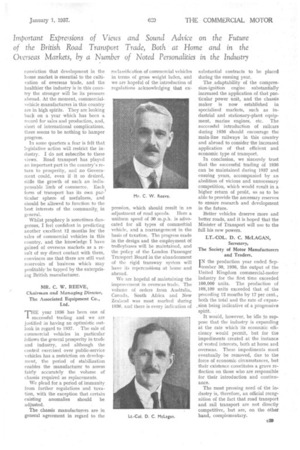
Page 90
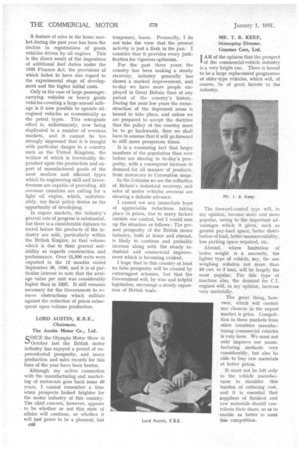
Page 91
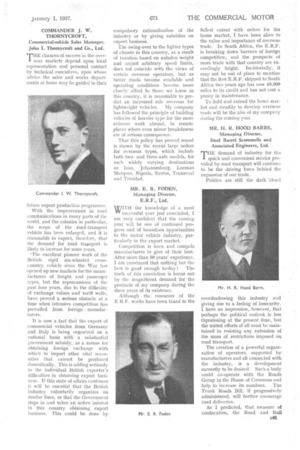
Page 92
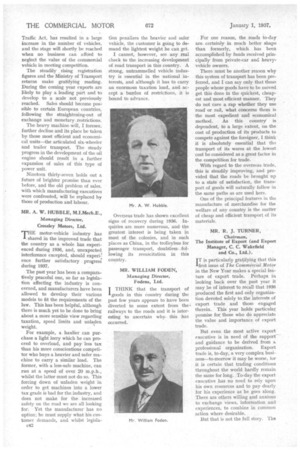
Page 93
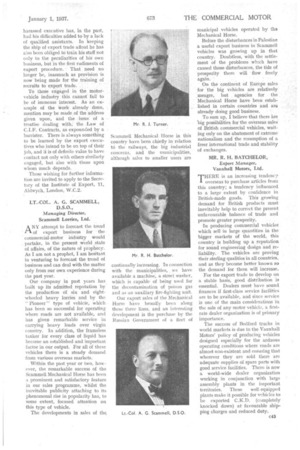
If you've noticed an error in this article please click here to report it so we can fix it.
of the British Road Transport Trade, Both at Home and in the Overseas Markets, by a Number of Noted Personalities in the Industry
conviction that development in the home market is essential to the cultivation of overseas trade, and the healthier the industry is in this country the stronger will be its pressure abroad. At the moment, commercialvehicle manufacturers in this country are in high spirits. They are looking back on a year which has been a record for sales and production, and, short of international complications, there seems to be nothing to hamper progress.
In some quarters a fear is felt that legislative action will restrict the industry. I do not subscribe to these views. Road transport has played an important part in the country's return to prosperity, and no Government could, even if it so desired, stifle the growth of such an indispensable limb of commerce. Each form of transport has its own particular sphere of usefulness, and should be allowed to function to the best interests of the community., in general.
Whilst prophecy is sometiines dangerous, I feel confident in predicting another excellent 12 months for the sales of commercial vehicles in this country, and the knowledge I have gained of overseas markets as a result of my direct contact with them, convinces me that there are still vast reservoirs of business which may profitably be tapped by the enterprising British manufacturer.
MR. C. W. REEVE, Chairman and Managing Director, The Associated Equipment Co., Ltd.
T" year 1936 has been one of successful trading and we are justified in having an optimistic outlook in regard to 1937. The sale of commercial vehicles in particular follows the general prosperity in trade and industry, and although the control exercised over public-service vehicles has a restriction on development, the period of stabilization enables the manufacturer to assess fairly accurately the volume of chassis required as replacements.
We plead for a period of immunity, from further regulations and taxation, with the exception that certain existing anomalies should be adjusted.
The chassis manufacturers are in general agreement in regard to the
reclassification of commercial vehicles in terms of gross weight laden, and we are hopeful of the introduction of regulations acknowledging that ex
pression, which should result in an adjustment of road speeds. Here a uniform speed of 30 m.p.h. is advocated for all types of commeetial vehicle, and a rearrangement in the basis of taxation. The progress made in the design and the employment of trolleybuses will be maintained, and the policy of the London Passenger Transport Board in the abandonment of the rigid tramway system will have its repercuskons -at home and abroad.
We are hopeful of maintaining the improvement in overseas trade. The volume of orders from Australia, Canada, South Africa and New Zealand was most marked during 1936, and there is every indication of
substantial contracts to be placed during the ensuing year.
The adaptability of the compression-ignition engine substantially increased the application of that particular power unit, and the chassis maker is now established in specialized markets, such as industrial and stationary-plant equipment, marine engines, etc. The successful introduction of railcars during 1936 kiould encourage the main-line railways in this country and abroad to consider the increased application of that efficient and economic type of transport.
In conclusion, we sincerely trust that the successful trading of 1936 can be maintained during 1937 and ensuing years, accompanied by an abolition of vicious and unnecessary' competition, which would result in a higher return of profit, so as to be able to provide the necessary reserves to ensure research and development in the future.
Better vehicles deserve more and better roads, and it is hoped that the Minister of Transport will use to the full his new powers.
LT. .COL. b. C. McLAGAN, Secretary, The Society of Motor Manufacturers and Traders.
IN the production year ended September 30, 1936, the output of the United Kingdom commercial-motor industry for the first time exceeded 100,000 units. The production of 108,109 units exceeded that of the preceding 12 mouths by 17 per cent., both the total and the rate of expansion being indicative of a progressive spirit.
It would, however, be idle to suppose that the industry is expanding at the rate which its economic efficiency would permit, but for the impediments created at the instance of vested interests, both at home and overseas. These impediments must eventually be removed, due to the force of economic circumstances, but their existence constitutes a grave reflection on those who are responsible for their introduction and continuance.
The most pressing need of the industry is, therefore, an official recognition of the fact that road transport and rail transport are not directly competitive, but are, on the other hand, complementary.
A feature of sales in the home market during the past year has been the decline in registrations of goods vehicles driven by oil engines. This is the direct result of the imposition of additional fuel duties under the 1935 Finance Act, the provisions of which failed to have due regard to the experimental stage of development and the higher initial costs.
Only in the case of large passengercarrying vehicles or heavy goods vehicles covering a large annual mileage is it now possible to operate oilengined vehicles as economically as the petrol types. This retrograde effect is, unfortunately, now being duplicated in a number of overseas markets, and it cannot be too strongly impressed that it is fraught with particular danger to a country such as the United Kingdom, the welfare of which is irrevocably dependent upon the production and export of manufactured goods of the most modern and efficient types which its engineering skill and inventiveness are capable of providing. All overseas countries are calling for a light oil engine, which, unfortunately, our fiscal policy denies us the opportunity of developing.
In export markets, the industry's general rate of progress is substantial, but there is a considerable distance to travel before the products of the industry are sold, particularly within the British Empire, in that volume which is due to their general suitability as regards construction and performance. Over 15,500 units were exported in the 12 months ended September 30, 1936, and it is of partkelar interest to note that the average value per unit was considerably higher than in 1935. It still remains necessary for the Government to remove obstructions which militate against the reduction of prices subsequent upon volume production.
LORD AUSTIN, K.B.E., Chairman, The Austin Motor Co., Ltd.
SINCE the Olympia Motor Show in October last the British motor industry has enjoyed a period of unprecedented prosperity, and many production and sales records for this time of the year have been beaten.
Although my active connection with the manufacturing and marketing of motorcars goes back some 40 years, I cannot remember a time when prospects looked brighter for the motor industry of this country. The chief concern, however, appears to be whether or not this state of affairs will continue, or whether it will just prove to be a pleasant, but c4t) temporary, boom. Personally, I do not take the view that the present activity is just a flash in the pan. I consider that it provides every justification for vigorous optimism.
For the past three years the country has been making a steady recovery, industry generally has shown a marked improvement, and to-day we have more people employed in Great Britain than at any period of the country's history. During the next few years the reconstruction of the depressed areas is bound to take place, and unless we are prepared to accept the doctrine that the policy of the couirtry must be to go backwards, then we shall have to assume that it will go forward to still more prosperous times.
It is a reassuring fact that larger numbers of the population than ever before are sharing in to-day's prosperity, with a consequent increase in demand for all manner of products, from motorcars to Coronation mugs.
In the Colonies we see the reflection of Britain's industrial recovery, and sales of motor vehicles overseas are showing a definite advance.
I cannot see any immediate hope of appreciable reductions taking place in prices, due to many factors outside our control, but I would sum up the situation as follows : The present prosperity of the British motor industry, both at home and abroad, is likely to continue and probably increase along with the steady industrial and commercial improvement which is becoming evident.
I hope that in this country at least no false prosperity will be created by extravagant schemes, but that the Government will, by wise and helpful legislation, encourage a steady expansion of British trade. MR. T. B. KEEP, Managing Director, Commer Cars, Ltd.
I AM of the opinion that the prospect of the commercial-vehicle industry is a very bright one. There is bound to be a large replacement programme of older-type vehicles, which will, of course, be of great benefit to the industry.
The forward-control type will, in my opinion, become more and more popular, owing to the important advantages which it gives, such as greater pay-load space, better distribution of load, better manceuvrability, less parking space required, etc.
Abroad, where limitation of laden weight is a necessity, the lighter type of vehicle, say, the one weighing unladen not more than 50 cwt. to 3 tons, will be largely the most popular. For this type of machine also, the demand for C.I. engines will, in my opinion, increase • very materially.
The great thing, however, which will control our chances in the export market is price. Competition in these markets from other countries manufacturing commercial vehicles is very keen. We must not only improve our manufacturing methods very considerably, but also be able to buy raw materials at better prices.
It must not be left only to the vehicle manufacturer to shoulder this burden of reducing cost, and it is essential that suppliers of finished and raw materials should contribute their share, so as to enable us better to meet this competition. COMMANDER J. W. THORNYCROFT, Commercial-vehicle Sales Manager, John I. Thornycroft and Co., Ltd.
THE chances of success in the overseas markets depend upon local representation and personal contact by technical executives, upon whose advice the sales and works departments at home may be guided in their
future export production programme.
With the improvement in road comrhunications in many parts of the world, and the colonies in particular, the scope of the road-transport vehicle has been enlarged, and it is reasonable to expect, therefore, that the demand for road trausport is likely to increase for some years.
The excellent pioneer work of the British rigid six-wheeled crosscountry vehicle since the War has opened up new markets for the manufacturers of freight and passenger types, but the repercussions of the past four years, due to the difficulty of exchange values and tariff walls, have proved a serious obstacle at time when intensive competition has prevailed from foreign Manufac turers. . .
It is now a fact' that the export of commercial vehicles. from 'Germany and Italy is "being organized on a national basis with a substantial ;overnmen€ subsidy, as a means for obtaining foreign exchange with which to import other vital necessities that cannot be produced domestically. This is adding seriously to the individual British exporter's difficulties in obtaining export business. If this state of affairs continues it will be essential that the British industry voluntarily organizes on similar lines, or that the Government steps in and takes an active intereSt in this country obtaining export business. This could be done by compulsory rationalization of the industry or by giving subsidies on export business.
The swing-over to the lighter 'types of chassis in this country, as a result of taxation based on unladen weight and unjust arbitrary speed limits, does not coincide with the views of certain overseas operators, but as better roads become available and operating conditions become more closely allied to those we know in this country, it is reasonable to predict an -increased sale overseas for lightweight vehicles. My company has followed the principle of building vehicles of heavier type for the more arduous work abroad, in remote places where even minor breakdowns are of serious consequence.
That this policy has proved sound is shown by' the recent large orders for overseas types, which include both, twoand three-axle models, for such widely varying destinations as Iran, Johannesburg, Lorenzo Marques, Nigeria, Santos, Transvaal and Trinidad.
MR. E. R. FODEN, Managing Director, E.R.F., Ltd.
WITH the knowledge of a most VV successful year just concluded, I am very confident that the coming year will be one of continued progress and of boundless opportunities to the motor vehicle industry, particularly in the export market..
Competition is keen and compels manufacturers to give of their best. After more than 50 years' experience, I am convinced that nothing but the
best is good enough to-day The troth of this conviction is borne out by the magnificent demand for the products of my company during the three years of its existence.
Although the resources of the E.R.F. works have been taxed to the fullest extent with orders for the home market, I have been alive to the value and importance of overseas trade. In South Africa, the E.R.F. is breaking down barriers of foreign competition, and the prospects of more trade with that country are exceedingly bright. Incidentally, it may not be out of place to mention that the first E.R.F. shipped to South Africa two years ago has now 40,000 miles to its credit and has not cost a penny in Maintenance.
To hold and extend the home market and steadily to develop overseas trade will be the aim of my company during the coming year.
MR. H. R. HOOD BARRS, Managing Director, Steel Barrel Scannnells and Associated Engineers, Ltd.
THE demand of industry for the quick and convenient service provided by road transport will continue to be the driving force behind the expansion of our trade.
Politics are still the dark cloud
overshadowing this industry and giving rise to a feeling of insecurity. I have an impression, however, that perhaps the political outlook is less threatening at the present time, but the united efforts of all must be maintained •in resisting any extension of the mass of restrictions imposed on road transport.
The creation of a powerful organization of operators, supported by manufacturers and all connected with the industry, is a development earnestly to be desired. Such a body
• could co-operate with the Roads Group in the House of Commons and help to increase its numbers. The Trunk Roads Bill, if progressively administered, will further encourage road deliveries.
As I predicted, that measure of confiscation, the Road and Rail
Traffic Act, has resulted in alarge increase in the number of vehicles, and the stage will shortly be reached when no business can afford to neglect the value of the commercial vehicle in meeting competition.
The steadily rising registration figures and the Ministry of Transport returns make gratifying reading. During the coming year exports .are likely to play a leading part and to develop to a scale not previously reached. Sales should become possible to certain European countries, following the straightening-out of exchange and monetary restrictions.
The heavy machine will, I foresee, further decline and its place be taken by. those most efficient and economical units—the articulated six-wheeler and trailer transport. The steady progress in the development of the oil engine should result in a further expansion of sales of this type of power unit.
Nineteen thirty-seven holds out a future of brighter promise than ever before, and the old problem of sales. with which manufacturing executives were confronted, will be replaced by those of production and labour.
MR. A. W. HUBBLE, M.I.Mech.E., Managing Director, Crossley Motors, Ltd.
THE motor-vehicle industry has shared in the improved trade that the country as a whole has experienced during 1936, and, unexpected interference excepted, should experi! ence further satisfactory progress during 1937.
The past year has been a coraparalively peaceful one, so far as legislation affecting the industry is concerned, and manufacturers have been allowed to develop their various models to fit the requirements of the law. This has been helpful, although there is much yet to be done to bring about a more sensible view regarding taxation, speed limits and unladen weight.
For example, a haulier can purchase a light lorry which he can proceed to overload, and pay• less tax than his more conscientious competitor who buys a heavier and safer machine to carry a similar load. The former, with a less-safe machine, can run at a speed of over 20 m.p.h., whilst the latter must not da so. This forcing down. of unladen weight in order to get machines into a lower tax grade is bad for the industry, and does not make for the increased safety on the road we are all looking for. Yet the manufacturer has no option; he must supply what his customer demands, and whilst legisla c42 tion penalizes the heavier and safer vehicle, the customer is going to demand the lightest weight he can get.
I cannot, however, see any real check to the increasing development of road transport in this country. A strong, untrammelled vehicle industry is essential in the national interests, and although it has to carry an enormous taxation load, and accept a burden of restrictions, it is bound to advance.
Overseas trade has shown excellent signs of recovery during 1936. Inquiries are more numerous, and the greatest interest is being taken in most of the colonies, and in such places as China, in the trolleybus for passenger transport, doubtless following its resuscitation, in this country.
MR. WILLIAM FODENT, Managing Director, Fodens, Ltd.
I THINK that the transport of
goods in -this country during the past few years appears to have been diverted to some extent from the railways to the roads and it is interesting to ascertain why this has occurred.
For one reason, the roads to-day are. certainly in much better shape than formerly, which has been accomplished by funds received principally from private-car and heavyvehicle owners.
There must be another reason why this system of transport has been preferred, and I can say only that those people whose goods have to be moved get this done in the quickest, cheapest and most efficient manner. They do not care a rap whether they use road or rail, what concerns them is the most expedient and economical method. As this country is dependent, to a large extent, on the cost of production of its products to compete against the foreigner, I think it is absolutely essential that the transport of its wares at the lowest cost be considered as a great factor in the competition for trade.
With regard to the overseas trade, this is steadily improving, and provided that the roads be brought up to a state of satisfaction, the transport of goods will naturally follow in the same paths as are used here.
One of the principal features in the manufacture of merchandise for the welfare of any country is the matter of cheap. and efficient transport of its materials.
MR. R. J. TURNER, Chairman, The Institute of Export (and Export Manager, C. C. Wakefield and Co., Ltd.).
I T is particularly gratifying that this
first issue of The COMMYCiai Motor in the New Year makes a special feature of export trade. Perhaps in looking back over the past year it may be of interest to recall that 1936 produced the first and only organization devoted solely to the interests of export trade and those engaged therein. This year holds particular promise for those who do appreciate the value and importance of export trade.
But even the most active export executive is in need of the supportand guidance to be derived from a professional organization. Export trade is, to-day, a very complex business—to-morrow it may be worse, for it is certain that trading conditions throughout the world hardly remain the same for long. To-day the export executive has no need to rely upon his own resources and to pay dearly for his experience as he goes along. There are others willing and anxious to exchange views, information and experiences, to combine in common action where desirable.
But that is not the full story. The
harassed executive has, in the past, had his difficulties added to by a lack of qualified assistants. In keeping the ship of export trade afloat he has also been obliged to train his staff not only to the peculiarities of his' own business, but in the first rudiments of export procedure. That need no longer be, inasmuch as provision -is now being made for the training of recruits to export trade.
To those engaged in the motorvehicle industry this cannot fail to be of immense interest. As an example of the work already done, mention may be made. of the address given upon, and the issue of a treatise dealing with, the CLaw of• C.I.F. Contracts, as expounded by a barrister. There is always something to be learned by the export executives who intend to be on top of their job, and it is of definite value to have contact not only with others similarly engaged, but also with those upon whom much depends.
Those wishing for further information are invited to apply to the Secretary of the Institute of Export, 11, Aldwych, London, W.C.2.
LT.-COL. A. G. SCAMMELL, D.S.O., Managing Director, Scammell Lorries, Ltd.
ANY attempt to forecast the trend . of export business for the commercial-motor industry would partake, in the present world state of affairs, of the nature of prophecy. As I am not a prophet, I am hesitant in venturing to forecast the trend of business and can deal with the matter only from our Own experience during the past year.
Our company in past years has built up its admitted reputation by the production of six and eightwheeled heavy lorries and by the " Pioneer" type of vehicle, which has been so successful for operating where roads are not available, and has given remarkable service in carrying heavy loads over virgin country. In addition, the frameless tanker for every class of liquid has become an established and important factor in our output. For all of these vehicles there is a steady demand from various overseas markets.
Within the past year or two, however, the remarkable success of the Scammell Mechanical Horse has been a prominent and satisfactory feature in our sales programme, whilst the inevitable publicity attaching to its phenomenal rise in popularity has, to some extent, focused attention on this type of vehicle.
The developments in sales of the, Scarnmell Mechanical Horse in this country have been chiefly in relation to the railways, the big industrial concerns, and the municipalities, although sales to smaller users are continually increasing. In connection with the municipalities, we have available a machine', a street washer, which is capable of being used for the decontamination of poison gas and as an auxiliary fire-fighting unit.
Our export sales of the Mechanical Horse have broadly been along these three lines, and an interesting development is the purchase by the Russian Government of a fleet of municipal vehicles operated by the Mechanical Horse.
Before the disturbances in Palestine a useful export business in Scammell vehicles was growing up in that country. Doubtless, with the settlement of the problems which have caused those disturbances, the tide of prosperity there will flow freely again.
On the continent of Europe sales for the big vehicles are relatively• meagre, but agencies for the Mechanical Horse have been established in certain countries and are already doing good business.
To sum up, I believe that there are possibilities for the overseas sales of British commercial vehicles, waiting only on the abatement of extreme nationalism and the resumption of a freer international trade and stability of exchanges.
MR. R. H. BATCHELOR, Export Manager, Vauxhall Motors, Ltd.
THERE is an increasing tendenc7 I overseas to purchase articles from
this country; a tendency influenced to a large extent by confidence in British-made goods. This growing demand for British products must inevitably help to correct the present unfavourable balance of trade and promote greater prosperity.
In producing commercial vehicles which sell in large quantities in the bigger markets of the world, this country is building up a reputation for sound engineering design and reliability. The vehicles are proving their sterling qualities in all countries, and as they become better known so the demand for them will increase.
For the export trade to develop on a stable basis, good distribution is essential. Dealers must have sound finances if first-class service facilities are to be available, and since service is one of the main considerations in the sale of any motor vehicle, a firstrate dealer organization is of primary importance.
The success of Bedford tracks in world markets is due to the Vauxhall Motors' policy of producing vehicles designed especially for the arduous operating conditions where roads are almost non-existent and ensuring that wherever they are sold there are adequate supplies of spare parts with good service facilities. There is now a world-wide dealer organization working in conjunction with large assembly plants in the important territories. These well-equipped plants make it possible for vehicles to be exported C.K.D. (completely knocked down) at favourable shipping charges and reduced duty.




























































































































































